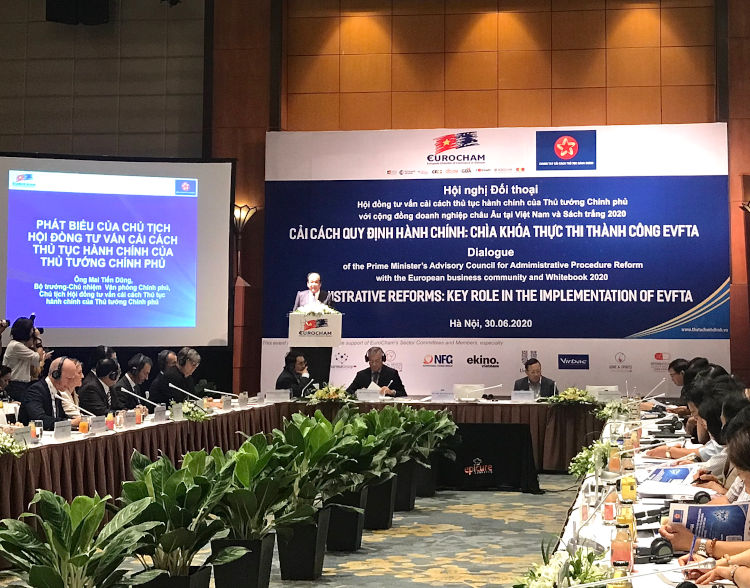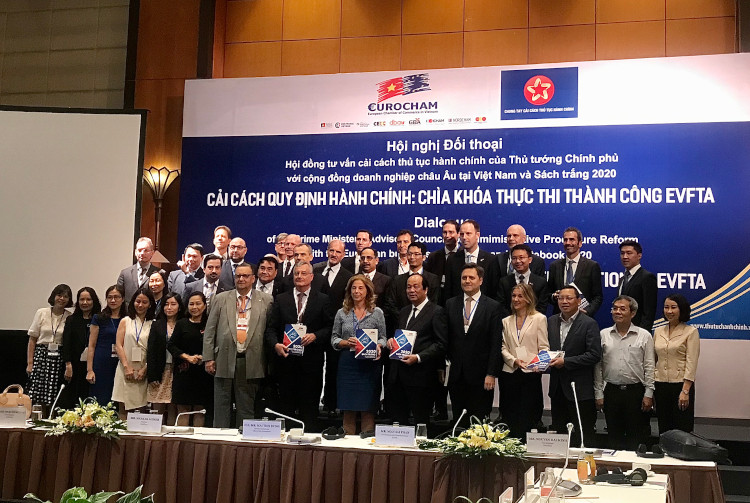Why EVFTA’s Success Will Depend on Vietnam’s Administration Reforms
Overview of the EuroCham & ACAPR Special Dialogue: “Administrative Reform: A Key Role in EVFTA Implementation”
On June 30, the European Chamber of Commerce in Vietnam (EuroCham) and the Prime Minister’s Advisory Council for Administrative Procedure Reform (ACAPR) co-organized a special dialogue in Hanoi, titled “Administrative Reform: A Key Role in EVFTA Implementation”, discussing this key issue to unlock the full potential of the European Union Vietnam Free Trade Agreement (EVFTA), set to take effect from August 1.
The event included special guest speaker H.E. Minister Mai Tien Dung, Chairman of the Office of the Government as well as several government officials, business leaders, investors, journalists, and members of the diplomatic corps.
At the event, EuroCham also launched the 12th edition of the EuroCham Whitebook, their flagship annual publication gathering the insights and concerns of European business, represented by 17 sector committees. The Whitebook also includes their recommendations to help improve the trade and investment environment in Vietnam.
The event’s discussion highlighted existing obstacles in business as well as administrative procedures faced by European enterprises in three major fields: business environment, healthcare and sustainable development, and consumers’ choice.
There are some highlights regarding cross-sectoral business environment and sector-specific recommendations by the EU business community that may influence certain industries in the medium term.
Vietnam’s business environment
Visas and entry of foreigners
At the event, H.E. Minister Mai Tien Dung discussed the issue of foreigners’ entry to Vietnam, which is the top concern of many investors during this sensitive period. At the moment, Vietnam is only allowing foreign experts working on projects to enter the country, provided that they strictly follow quarantine measures. He expressed the government’s willingness when committing that any document requesting allowance for foreign investors’ and specialists’ entry sent to the Office shall be addressed within one working day.
Market Access
Speaking on behalf of EU businesses, the Legal Committee emphasized certain limitations of market access for foreign investors in Vietnam. Some barriers that were mentioned include the existence of over 200 conditional business sectors, wide-ranging foreign ownership caps, cumbersome and time-consuming merger control notification process, and so on.
It is known that recommendations by the EU business community have been taken into consideration by the Vietnamese government when the Law on Investment 2020 abolished 22 conditional business sectors and added more incentives for certain projects.
Work permits
The Legal Committee also expressed their concern on regulations regarding work permits for foreign workers in Vietnam. The draft Decree dated Aril 2020 stipulates a threshold of US$215,000 (VND 5 billion) of capital contribution for the owner or capital-contributing member of a limited liability company to be exempted from a work permit. EU businesses believe this high threshold may discourage foreign investors and recommended setting a lower value.
Responding to this suggestion, the Ministry of Labor, War Invalids and Social Affairs (MOLISA) urged EuroCham to offer a specific threshold so that they could evaluate the rationality of this level and lower the current one.
E-signatures
Another hindrance in Vietnam’s business environment was the lack of comprehensive regulations on the adoption of digital signatures, as pointed out by the Digital Sector Committee.
The EU has adopted three types of e-signatures since 2016, including the Basic, Advanced and Qualified electronic (or digital) signatures. However, the Vietnamese government only recognizes the Qualified electronic type, which leads to confusion and reluctance from both foreign and local enterprises in applying solutions other than this type.
The underlying reason is the lack of a rational system to verify unqualified electronic signatures by EU businesses, as explained by the official of the Ministry of Science and Technology. In response to the problem, the Ministry is also working to develop a system to identify and approve other types of e-signatures by foreign entities.
Speaking at the dialogue, EuroCham Chairman Nicolas Audier and Deputy Head of the Delegation of the EU to Vietnam Axelle Nicaise gave prominence to the establishment of EVFTA’s Business Council as a crucial entity contributing to address concerns and upcoming challenges when the EVFTA takes effect in the post-COVID-19 period.
Sector-specific recommendations
Pharmaceuticals
Vietnam is an attractive market for pharmaceuticals. It is estimated that the country imports around 55 percent of total demand for this product. A major share of which comes from EU nations. With the FTA in effect, approximately half of EU pharmaceutical imports will be duty-free immediately with the rest exempted from duty after seven years. Foreign pharmaceutical companies will be allowed to establish a company to import pharmaceuticals that have been authorized to be sold in the Vietnamese market.
As the voice of EuroCham Healthcare Forum, the Pharmaceuticals Sector Committee presented the untapped potential of the pharmaceutical industry. The development of this sector is forecast to attract US$100 million of investment throughout the industry and increase the pharmaceutical market value by up to US$27.6 billion, according to accounting firm KPMG.
Meanwhile, only seven of the 166 newly launched drugs in the US and EU5 (Germany, Spain, France, Italy, and the UK) are launched in Vietnam, with an average lag of 38 months behind the US and EU5, from 2014 to Q2 2019. In this context, administrative reform is key to improving access to innovative pharmaceutical products for Vietnamese patients. Suggestions from the EU business community focus on promoting innovation, enabling Vietnam to be a leading R&D destination, a brand name manufacturing hub as well as developing digital healthcare infrastructure.
The EuroCham Healthcare Forum also recommended the establishment of an external expert working group representing different foreign and domestic pharmaceutical companies to work closely with the Ministry of Health for the benefits of Vietnamese patients, state budgets, and companies. The issue was noted by government officials.
Automobiles
Vietnam’s automobile market has grown significantly in recent years thanks to the country’s fast-growing middle class. With the upcoming EVFTA, the Vietnamese market will be fully open to major automotive production centers of the EU by 2030. In 2019, Vietnam’s imported completely built unit (CBU) passenger cars increased by 54 percent to almost 91,000 vehicles.
Meanwhile, the registration fees for all passenger cars or cars with less than nine seats in Vietnam ranged from 10 percent to 12 percent of the car price. However, on June 28, Vietnam’s Prime Minister Nguyen Xuan Phuc signed Decree 70 allowing a 50 percent cut in registration fees for customers who buy locally produced or assembled cars, to stimulate post COVID-19 domestic consumption. Among the 19 European auto brands in Vietnam, only Mercedes and Peugeot enjoy a 50 percent reduction in registration fees for some of their models assembled in the country.
In the dialogue, the Mobility – Automotive sector committee has proposed that the Vietnamese government halve registration fees for imported cars, similar to the case of locally produced or assembled cars, to ensure fairness due to the financial impact caused by the global pandemic.
Food, agricultural, and aqua industry
According to recent research findings jointly released by the European Trade Policy and Investment Support Project (MUTRAP EU-Vietnam) and the Vietnam Chamber of Commerce and Industry (VCCI), there are about 9,000 enterprises involved in the food manufacturing industry across Vietnam. Those companies, including EuroCham members have experienced a challenging 2019 due to a pork supply shortage and African Swine Fever in Vietnam. In addition, in the first half of 2020, they were also hit by COVID-19, which led to production and export stagnation.
Encouragingly, with the reduction of tariffs for both parties, the EVFTA would strongly promote bilateral trade for commodities such as foods, agriculture, and seafood products. However, countless food safety incidents arising from a lack of adequate regulatory enforcement exposed food supplies to foodborne illnesses throughout the trade process. Therefore, EuroCham recommends administrative reforms with the establishment of a “centralized food safety agency” to accelerate the process.
Takeaways
In general, the benefit of the EVFTA is beyond tariff removal. Further, it also enhances the transparency and predictability of Vietnam’s legal framework and business environment. The trade pact will promote regional production restructuring and turn Vietnam into a manufacturing hub by attracting larger FDI flows associated with technology transfer. In that context, both EU and Vietnamese enterprises must be aware of the market opportunities and fully prepare to embrace the upcoming challenges.
About Us
Vietnam Briefing is produced by Dezan Shira & Associates. The firm assists foreign investors throughout Asia from offices across the world, including in Hanoi and Ho Chi Minh City. Readers may write to vietnam@dezshira.com for more support on doing business in Vietnam.
- Previous Article The EVFTA: Understanding Rules of Origin
- Next Article Despite Economic Slowdown, Vietnam Banks on Domestic Tourism and Real Estate



































